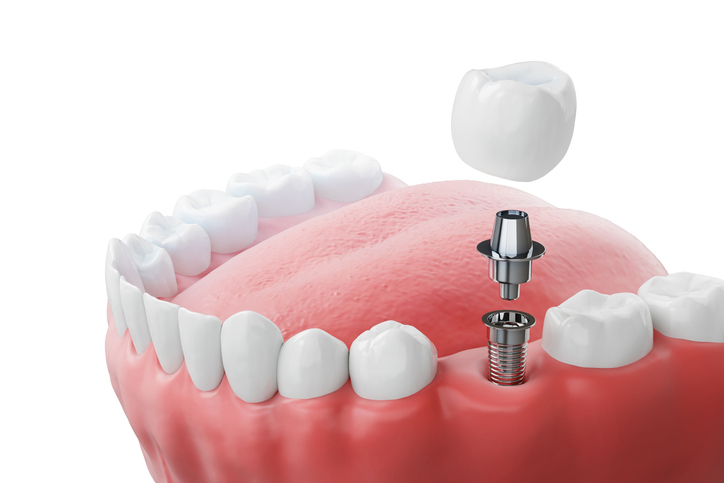
One of the most reliable and long-lasting solutions for tooth loss is dental implants. Unlike other tooth replacement options such as dentures or bridges, dental implants provide a stable, permanent foundation that mimics the function and appearance of natural teeth. In this guide, we’ll explore the five key signs that indicate you may be a good candidate for dental implants and why they are an excellent choice for restoring both your smile and oral health.
Sign 1: Missing Teeth
Missing teeth are one of the most obvious reasons to consider dental implants. Not only can gaps in your smile affect your appearance, but they can also have a significant impact on your oral health. When a tooth is lost, the neighboring teeth may begin to shift into the empty space, leading to misalignment. This movement can create additional problems with your bite, making it harder to chew and speak properly.
Moreover, missing teeth leave the jawbone in that area without stimulation, which can lead to bone resorption over time. Dental implants act as artificial tooth roots, providing the necessary stimulation to the jawbone, preventing further bone loss. The implant integrates with the bone, creating a strong, stable foundation that supports a crown, bridge, or even full-arch restoration. If you have one or more missing teeth, dental implants offer a permanent solution that not only restores your smile but also preserves your oral health.
Sign 2: Loose or Shifting Teeth
Loose or shifting teeth can be a sign of periodontal disease or bone loss, both of which can lead to the eventual loss of teeth. Periodontal disease, if left untreated, weakens the supporting structures around the teeth, including the gums and bone. As the bone deteriorates, the teeth may become loose, and in severe cases, they may fall out.
If you’re experiencing loose teeth, it’s crucial to seek professional care as soon as possible. Dental implants can serve as an effective solution for replacing teeth that are already lost or for stabilizing the jawbone to prevent further deterioration. The implants integrate with the jawbone, providing stability to the surrounding teeth and helping to prevent additional bone loss. If your teeth are shifting or becoming loose, dental implants may be the best option for restoring stability and protecting your remaining teeth.
Sign 3: Difficulty Chewing or Speaking
Teeth play a critical role in both chewing and speaking, and when they are damaged or missing, these daily functions can become more challenging. If you’ve noticed that it’s becoming harder to chew certain foods or that your speech is slurred, it could be a sign that your teeth are either worn or no longer functioning properly.
Dental implants offer a way to restore full functionality to your mouth. Because implants are anchored securely into the jawbone, they function much like natural teeth. This means that you can chew, bite, and speak with confidence. Unlike dentures, which may shift or become loose, implants provide a stable, comfortable fit. If you’re struggling with basic tasks like chewing or speaking, dental implants can help you regain your confidence and quality of life.
Sign 4: Jawbone Deterioration
One of the lesser-known consequences of tooth loss is the deterioration of the jawbone. When a tooth is lost, the jawbone in that area no longer receives the stimulation it needs to maintain its density. Over time, this can lead to bone resorption, which can cause the face to appear sunken or aged. The longer the jawbone goes without stimulation, the more bone is lost, making it harder to place implants in the future.
Dental implants are unique in that they stimulate the jawbone just like natural tooth roots. The titanium post of the implant encourages new bone growth, helping to preserve the structure and density of the jaw. This not only prevents further bone loss but also maintains the natural shape of your face. If you’ve experienced bone loss due to missing teeth, dental implants can be a crucial step in preserving your oral health and appearance.
Sign 5: Worn or Broken Teeth Beyond Repair
Teeth that are severely worn down or broken may not be salvageable through traditional dental work such as crowns or bridges. In these cases, dental implants can provide a more permanent solution. Severely damaged teeth can lead to infections, pain, and other complications if not addressed promptly.
Dental implants offer a long-lasting alternative to repairing worn or broken teeth. Instead of constantly needing repairs or replacements for crowns and bridges, an implant can provide a permanent fix. Implants not only restore the function of your teeth but also their appearance, giving you a natural-looking smile that’s built to last. If your teeth are worn or broken beyond repair, dental implants may be the best option for restoring your oral health.
Take Action and Restore Your Smile
If you’ve noticed any of the signs mentioned—whether it’s missing teeth, loose teeth, difficulty chewing or speaking, jawbone deterioration, or severely worn or broken teeth—it may be time to consider dental implants. Dental implants are a long-lasting, stable solution that not only improves the appearance of your smile but also protects your oral health.
At Implant & Perio Center of Kansas, our experienced team, led by Dr. Marq J. Sams, is here to help you determine if dental implants are the right solution for your needs. Schedule an appointment with us today to take the first step toward restoring your smile and improving your quality of life. We look forward to helping you achieve a healthy, beautiful smile that lasts a lifetime.
